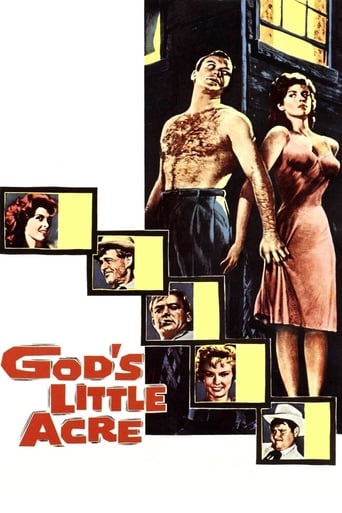Prismark10
The jaunty title song belies what lies beneath this southern Gothic drama from the ever reliable director Anthony Mann who loads this film with various subtexts.Robert Ryan gives a marvellous performance as patriarch Ty Ty Walden who has spent years digging up his farmland looking for gold buried by his grandfather sometime in the civil war. Maybe things would had been better if Waldens farmed the land as the family might have turned out better with tighter morals.Ty Ty has three sons and two daughters. One of the son, jealous, hot headed Buck is married to sultry Griselda but she always had a thing for Will Thompson. He lost her but ended up marrying TY Ty's daughter Rosamund but Will has always pined for Griselda and the closed down mill in the town.Darlin Jill the youngest daughter is a fee spirited filly who is being courted by Pluto, a fat man running for the job of Sheriff.Jim Leslie is the son who got away, married into wealth and lives in Augusta but he also has the hots for Griselda and does little to hide it. As Ty Ty comments, some of the men in the family are far from chivalrous when it comes to handling women.Only Shaw the youngest son tries to keep everyone together but in this pot boiler with different vignettes it is Ty Ty who eventually realises that his quest for gold and digging holes in his field has crated a chasms in his family. Director Mann brings out fine performances from his cast and I think he had the censor sweating over some of the playful and sensual scenes.
edwagreen
Something very different for Robert Ryan. For a change, he is not the embodiment of evil. Rather, he stars as a poor dirt farmer in rural Georgian, a religious man, searching for gold on his land.The film shows the dissolution of family life. The eldest son lives in wealth as a widower and has not but contempt for his father. A daughter-in-law really loves a man (Aldo Ray) who is married to Ryan's other daughter.The film depicts what can happen when people are thrown out of work-such as when the mill closes. The Ray character turns to alcohol and his wish to break down the gates and put the lights back on as a symbol of the return of a dying industry. Tragedy results when he achieves this.Buddy Hackett co-stars as a simplistic, idiotic want-to-be sheriff who also loves Ryan's youngest daughter. Trouble is that she isn't that young and finds love with the albino, the totally white Michael Landon, who is supposed to help the family search for goals.This is definitely a picture of family values, disappointments, tragedies and ultimate redemption.
DJJOEINC
God's Little Acre - 1958 Anthony Mann flick about a group of hillbillies in Georgia.Robert Ryan is the aw-shucks gold digging patriarch of this mess of a family.This southern melodrama has kidnapping,adultery,albino(played by Michael Landon) and Tina Louise's cleavage.Picture a mix of Gomer Pyle,Dukes of Hazard & I don't know um grits- then you have this odd duck of a movie.Jack Lord,Buddy Hackett,Aldo Ray & Vic Morrow tear up the scenery in this share-cropper soap opera.This movie feels like an overgrown black and white cartoon portrayal of the south.I got this on the cheap- C-The DVD is a good transfer-- but has no extrasnot even a trailer
marcslope
What this and "Tobacco Road," Erskine Caldwell's other magnum opus, have in common is a portrait of the Deep South as populated by a people with a collective IQ of about 50. There's Robert Ryan as the clueless patriarch convinced that his granddaddy buried gold treasure on his land; he's a God-lovin' cuss but a hypocrite, forever changing his life rules to accommodate his avarice. There's Buddy Hackett (of all people) as a sheriff candidate who can't even paint an "N" correctly, in love with one of Ryan's nubile daughters. Characters have names like Ty Ty and Darlin' Jill, to make them more folksy, I guess, and the themes are greed and lust, most particularly between Tina Louise (the camera lovingly caressing her breasts at every turn) as Ty Ty's sassy daughter-in-law, desperately craving her brother-in-law, Aldo Ray. Tina Louise was sho' 'nuff all woman, and Aldo Ray all man, and I'll long remember their encounter at the water pump. The characters' collective idiocy gets on one's nerves, and the various conflicts resolve themselves entirely unconvincingly, but it's not a total loss. Ernest Haller's handsome black-and-white widescreen photography does capture the heat and grime of the cotton fields, and Elmer Bernstein's score is very good fake Copland.




